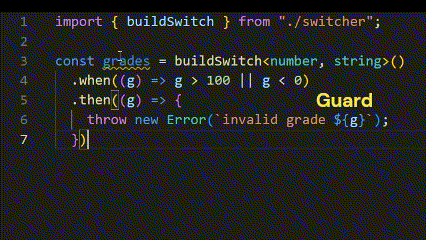oz-branch-free
v1.2.0
Published
Library with alternatives to hard coded switch-case and if-else blocks
Downloads
20
Maintainers
Readme
oz-branch-free
Library with alternatives to hard coded switch-case and if-else blocks
createMessageHandler
createMessageHandler creates an async handler so any subscriber can decide if it can and should handle the message arriving and return the a value accordingly.
import { createMessageHandler } from "oz-branch-free";
const handler = createMessageHandler<string>();
const unsubscribeTooShort = handler.subscribe(
(str: string) => str.length < 4,
(str: string) => `'${str}' is too short`
);
const unsubscribeTooLong = handler.subscribe(
(str: string) => str.length > 9,
(str: string) => `'${str}' is too long`
);
const resShort = await handler.handle("abc");
console.log(resShort); // output: 'abc' is too short
const resLong = await handler.handle("1234567890");
console.log(resLong); // output: '1234567890' is too long
unsubscribeTooShort();
const resShortUnSubscribe = await handler.handle("abc");
console.log(resShortUnSubscribe); // output: undefinedEach subscription can be removed.
Constructor options:
{
breakOnFirst: boolean;
}If breakOnFirst is true (default), the message handler stops once it find a match. The callback has action next() to override this behavior.
Otherwise (breakOnFirest is false), the message handler continue for all subscribers. The callback has action stop() to override this behavior.

The next code shows that even if we init the message handler to run all (breakOnFirst is false), we can still stop it at the handler.

const handler = createMessageHandler<string>({ breakOnFirst: false });
handler.subscribe(
(str: string) => str.length > 3,
(str: string, action: ContinueAllActionable) => {
action.stop();
return `Longer: ${str.length}`;
}
);
handler.subscribe(
(str: string) => str.length > 3,
(str: string) => {
return "This will not run";
}
);
const res = await handler.handle("abcd"); // Longer 4createMessageHandlerSync
Synchronous version of createMessageHandler
objectMapper
objectMapper takes an expression and returns a value against a series of case clauses.
The default value will be returned if no case matches the expression's value.
objectMapper is an alternative to switch with O(1) access.
import { objectMapper } from "oz-branch-free";
const mapper = objectMapper(
{
a: 1,
b: false,
c: [1, 2, 3],
},
"Some default"
);Now you have intelicense with types for existing properties:
 ?raw=true
?raw=true
as well as for non existing properties:

mapper.a; // returns a number: 1
mapper["a"]; // returns a number: 1
mapper.b; // returns a boolean: false
mapper["b"]; // returns a boolean: false
mapper.c; // returns an array: [1, 2, 3]
mapper["c"]; // returns an array: [1, 2, 3]
mapper.d; // returns a string: 'Some default'
mapper.anyValidPropName; // returns a string: 'Some default'
mapper["any-prop-name"]; // returns a string: 'Some default'buildSwitch
buildSwitch is an alternative for enriched switch-case with more options to compare and to handle.
buildSwitcher has an input and output types.
You can use a value or a function to when / then statements.
After when must come then.
After default, execute is the only option.
// converts grades numbers to letters
// order is important
const grades = buildSwitch<number, string>()
.when((g) => g > 100 || g < 0)
.then((g) => {
throw new Error(`invalid grade ${g}`);
})
.when(100)
.then("Ace") // special case :-)
.when((g) => g >= 90)
.then("A")
.when((g) => g >= 80)
.then("B")
.when((g) => g >= 70)
.then("C")
.when((g) => g >= 60)
.then("D")
.default("F");
const grade = grades.execute(95); // "A"
